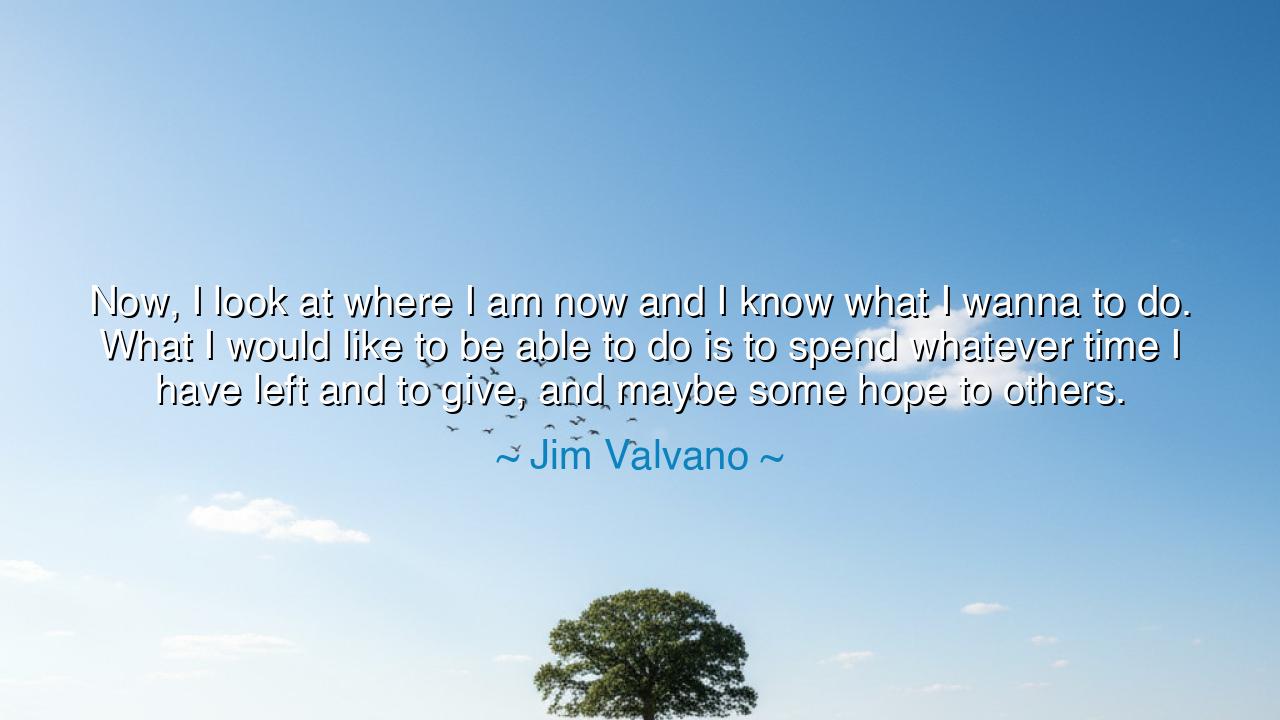
Now, I look at where I am now and I know what I wanna to do. What
Now, I look at where I am now and I know what I wanna to do. What I would like to be able to do is to spend whatever time I have left and to give, and maybe some hope to others.






In the councils of elder voices, hear Jim Valvano speak with the bravery of one who has looked into the furnace and chosen to sing: “Now, I look at where I am now and I know what I wanna to do. What I would like to be able to do is to spend whatever time I have left and to give, and maybe some hope to others.” This is the vow of a man who has weighed his days like gold dust and decided to spend them lavishly—on others. He does not deny the darkness; he redirects it, turning fear into fuel, diagnosis into purpose, and the last stretch of road into a lantern-lit procession for those behind him. In the old tongue we would say: he chose the honorable use of the dwindling light.
The meaning of his words is flint against despair. To spend the remaining time is not to hoard it, counting minutes like a miser, but to pour it where it matters most—into the lives of others. To give is to declare that love outlives the body; to offer hope is to place a torch in another hand and say, “Run farther than I could.” This is a warrior’s charity: to take what is left after the wound and still bless the field.
The origin of this vow is the night of March 4, 1993, at the inaugural ESPY Awards, when Valvano—already very ill—rose to accept the Arthur Ashe Courage Award and announced the birth of a new cause. In that speech he set forth his creed with the words quoted here, promising to devote his remaining time to giving hope and help, and unveiling what became the V Foundation for Cancer Research with its charge, “Don’t give up. Don’t ever give up.” He spoke without cue cards, with humor and fire, and only weeks later he was gone—yet his vow did not end; it multiplied.
Behold how a personal resolve becomes a public river. From that night’s vow flowed a foundation that has funded research and lifted families that might otherwise have drowned in bills and sorrow. The speech is remembered for its laughter, its tears, and its thought—Valvano’s threefold rhythm for a full day—but beneath those memorable lines ran this deeper current: if we cannot lengthen our days, we can deepen their meaning; if we cannot add years to life, we can add life to years—and to another’s years as well.
Consider a parallel from another shore. A teacher I knew—no trophies, no television lights—received a hard diagnosis one autumn. He chose a valedictory year not of retreat but of blessing: morning letters to former students, evening calls to reconcile old rifts, Saturday workshops where he taught the craft he loved for free. He said, “If I have little oil, I will pour it into many lamps.” At term’s end, the city auditorium filled with nurses, carpenters, coders, and choir mothers. They said his last year had given them their first hope in a long time. Like Valvano, he paid out his time as alms, and the interest continues.
This teaching is stern and tender. The ancients would say: when the horizon draws near, translate emotion into action. Hope is not a wish but a work—food cooked, funds raised, letters written, a hand held at 3 a.m., a policy drafted, a lab endowed. Valvano himself turned a speech into a structure, an applause into an institution. So must we: let feeling be the spark, and building the flame.
Take, then, a rule of life in four small labors. First, designate a daily “Jimmy V minute”: one phone call, one note, one gift that places hope in another’s hands. Second, choose a cause and set a measurable vow—money, hours, or skills—and keep it as you would keep a sacred fast. Third, schedule your compassion: put names on a calendar so love survives hurry. Fourth, prepare your legacy folder now—passwords, blessings, stories, and bequests—so that your giving continues when your voice is quiet. These are humble tools by which ordinary people perform extraordinary mercies.
Let the cadence of his vow march with you: time, give, hope. Say it when fatigue crouches at the door; say it when fear tries to spend your days on dread. For the lamp of a life is not measured by its oil but by its light upon the road. Valvano showed us how to burn bright at dusk: to turn the last miles into guidance for the travelers to come, to grip the world with generosity, and to leave behind a trail of flames that whisper to all who follow—do not give up; do not ever give up.






AAdministratorAdministrator
Welcome, honored guests. Please leave a comment, we will respond soon